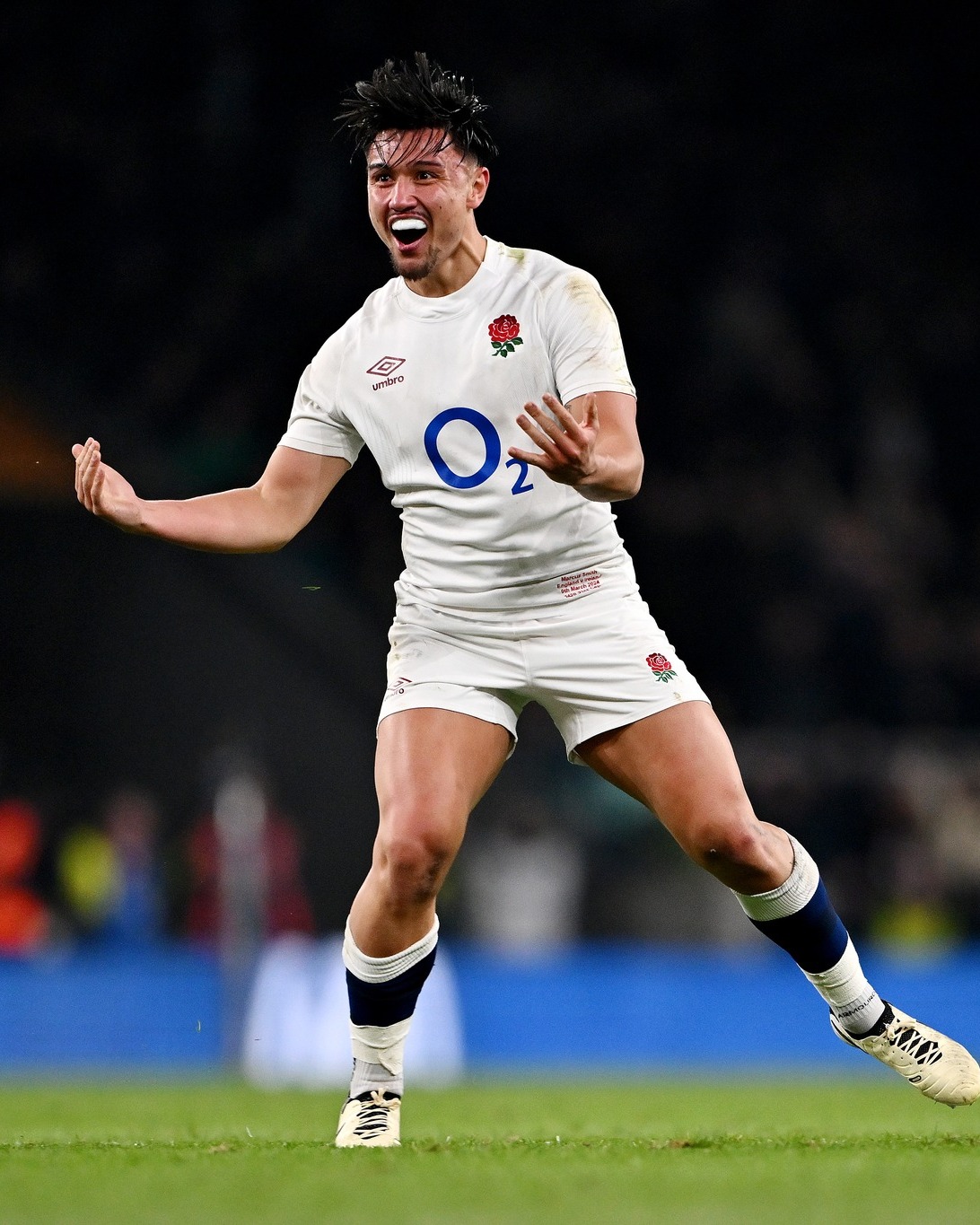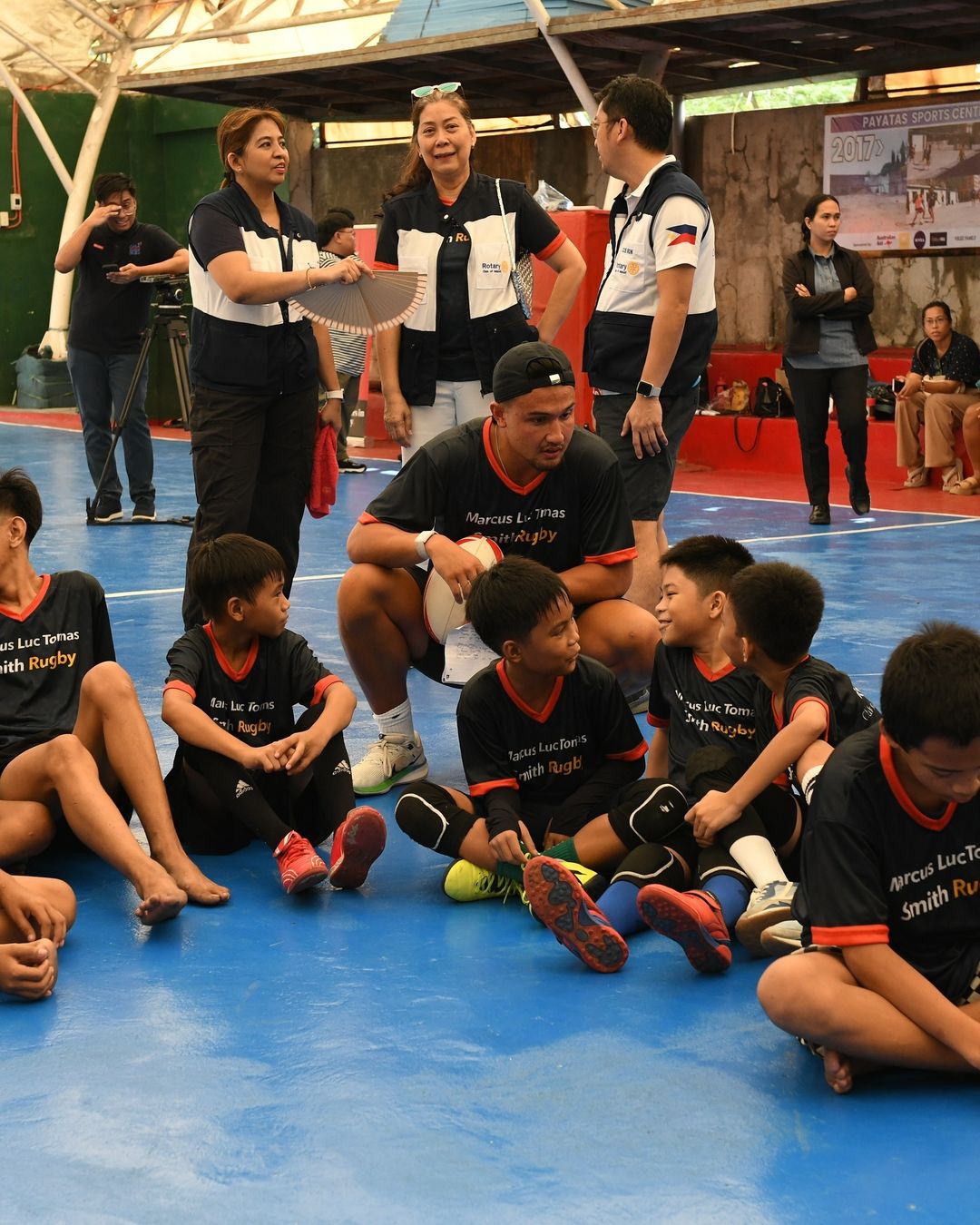Get to know Filipino-British rugby star Marcus Smith, from his humble roots to his hope of impacting Pinoy kids’ lives with the sport.
In the Philippines, it’s not too often that you come across an athlete (or even a fan) who plays the sport of rugby. Besides our current sporting culture, Philippine rugby has yet to glorify a hometown hero who makes a big splash in the sport, as we sometimes see with other sports like American Football.
But it’s not like rugby is nonexistent in the Philippines either. We have a national team in the Philippine Volcanoes, and a governing body in the Philippine Rugby Football Union (PRFU). Several Filipino-blooded players have also played across Europe and Asia over the years.
But perhaps our biggest name in rugby, for Filipinos in particular, will be Marcus Smith, a star in the English rugby scene. Born to an English father and Filipino mother, 25-year-old Marcus is a fly-half for the Harlequins in Premiership Rugby, and the England men’s national team.
Marcus recently got the chance to return to the Philippines for the first time in seven years. In an exclusive interview with The GAME, we discover his path to rugby stardom, as well as his hopes to promote the sport in the Philippines.
Rugby roots in Manila
Surprisingly enough, Marcus Smith’s love for rugby began in his birthplace: the Philippines. He recalls being a fixture at the old Manila Nomads pitch in Merville, where he watched his parents play rugby and other sports.
Eventually, Marcus’ dad and a friend set up a junior rugby club, where he first held a rugby ball. It was love at first sight.
“The joy that my brothers and I shared together on the field, the competitions that we took part in, not just my brothers, but with friends, it was special and it put a massive smile on my face, which is the main reason why I fell in love with the game,” Marcus recalls.
A professional rugby career, however, wasn’t Marcus’ immediate dream. On the contrary, as a teenager, the Quins star once dreamt of being a professional football player. Apart from his passion for the sport, safety was a crucial factor in young Marcus’ dreams.
“I enjoyed it and I was a bit smaller [at 5-foot-9] than everyone else in rugby. So I guess for my safety, trying to stay away from injuries, probably football was the route I wanted to go down. [But] I guess this is the path that chose me.”
But it seemed as though rugby truly was in the cards for this versatile athlete. Marcus’ path to rugby stardom was solidified in England when he attended a “predominantly rugby” school at 13 years old. His father was also a rugby fan, who urged him to fully embrace the sport.
But Marcus still had a lingering desire to play football, and for about a year, he felt somewhat torn between the two. Fortunately, however, his teenage self would receive much-needed signs.
“At 14 [years old], I didn’t get in a trial for football,” recalls Marcus.
Marcus continued to thrive as a rugby player and started “ticking the boxes” in terms of player preferences. Eventually, clubs began to express interest.
“At 15, I then got picked by Harlequins Junior Academy. From then on, every single year, I did the trainings with the Quins. They really looked after me, they really supported me,” he says. “At 18, I was lucky enough. They [Harlequins] offered me a professional contract, which was a special day and a dream come true for myself and my family as well.”
Whirlwind career
It’s been eight years since Marcus Smith turned pro for the Harlequins. Reflecting on his career, he’s described it as a “whirlwind of ups and downs” and something he’s enjoyed every single minute.
“It’s flown by because I’ve loved it so much, and I’m hoping that the next eight years are going to be even more fun and hopefully more successful as well,” he said.
2021 remains as Marcus’ best year in the pros, with the Quins winning their second Premiership title. That year also culminated in his first-ever England men’s appearance, following his time in the U18 and U20 teams.
The England men’s call-up was a pinch-me moment for Marcus, who fondly recalled the moment he received the news.
“I was on the plane, and I turned my phone back on, and I flipped my phone on, and all the notifications started coming in on my Instagram. I was pretty shocked, to be honest, to see that,” he said.

“And I guess rubbing shoulders with idols that I’ve enjoyed watching and to be able to be in the same room, to be able to learn off them and ask them questions was, for me as a young player, as a young kid, was amazing,” said Marcus, citing legendary fly-halves like Owen Farell and George Ford as some examples.
As his career continues, Marcus Smith hopes to continue winning Premiership trophies with the Quins, as well as the games he’ll play with the national teams. He also plans to further his advocacy to inspire young kids to take up sports.
“I want to inspire, hopefully, the younger generation to firstly get into rugby and enjoy rugby. But as well as that, inspire them to do sport, whatever sport that is, to hopefully stay out of trouble and do the right thing, not just here in the Philippines, but in England as well,” he said.
‘Filipinos can thrive in rugby’
As a Manila-born rugby lifer, Marcus believes Filipinos can thrive in rugby. Marcus cited his younger brother Luc, and the Philippine Volcanoes as a big example.
“You see the success that they’ve achieved with limited resources. It’s amazing. And I believe that if we support rugby and if we enable the Filipinos to get hold of rugby and thrive in the sport with the right resources, I believe that they can achieve,” he said.
“I believe Filipinos are powerful enough, fast enough, skillful enough, given the opportunity, they can.”
During the interview, Marcus was fresh off a charity event in Payatas, where he was able to interact and teach the basics of rugby to Filipino kids. It turned out to be a heartwarming experience for the English star.

“The minute we arrived, they were so welcoming, they were so smiley. For us, for my brothers and I and my mum, to be able to be given that opportunity to meet the kids and to meet the coaches was a memory I’ll never forget,” he recalled.
The potential was also evident in Payatas, which solidifies Marcus’ earlier point.
“In terms of rugby, the minute they held the ball, to be honest, I think they really enjoyed, I guess, a different sport, trying to learn different skills with your hands. But for me, there’s a lot of transferable skills from basketball, passing, and handling the ball that they picked up very quickly.”
“The bravery and how tough they are, they wanted to tackle even though it was touch. I’m sure the next time we can develop and elaborate on their tackle as well.”
Marcus also has a grander plan to elevate Philippine rugby. Right now, he’s already in touch with some of the Philippine Volcanoes to kickstart a long-term turnaround.
Using his expertise and professional experience, Marcus plans to help the Volcanoes improve, which will create even more visibility and hopefully, more passion for rugby. On top of this, he also wishes to coordinate with local clubs, including the Nomads, to plan skills camps in the future.
“Whenever I come back, I wanna do things like go to Payatas, give them rugby balls. Try and coach them rugby ’cause like I said, it changed my life, and I don’t see why it can’t suit Filipinos, suit us…and I hope to see many of the youngsters now playing for the Philippine Volcanoes in the future.”
Banner image by Grant Babia.
